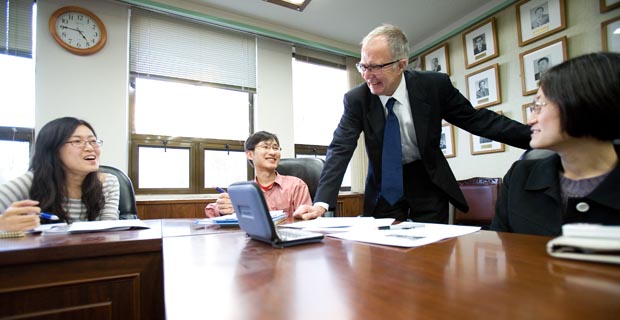
Professor Anthony Woodiwiss' first visit to Asia happened by pure chance. The University of Essex had an exchange program with Japan, which in the 1980s was a little too exotic for most of his colleagues who were much more interested in going to the US or Australia. Professor Woodiwiss, however, had long been intrigued by a photograph of a traditional Japanese room he had seen as a child - it looked so modern - and so he decided that he would take his chances. At the time, the sight of white Europeans was so rare that the children in his suburban Tokyo neighborhood would gawk at him and laugh. Of course, things have changed hugely in East Asia since then. On his arrival in Seoul a few months ago, Professor Woodiwiss says, while sipping his Chinese quince tea, that his biggest problem has been finding a duvet cover.
Duvet covers aside, the transition has been smooth. Professor Woodiwiss, who teaches two classes - a Ph.D. practicum helping beginning doctorate students to develop their research topics, and an undergraduate course on the sociology of human rights - seems to be enjoying himself here. Human rights as an academic discipline or course of instruction is still rare in Korean universities, and he is already stirring debate and encouraging students to consider issues in a different light. In his undergraduate class, attended by five"very brave" students. For example, when Professor Woodiwiss suggested that perhaps the real origin of the idea of human sacrifice rather than a mythical social contract a very lively discussion ensued. Newcomers to the field of human rights are often surprised by the fact that human rights scholars do not believe that rights are a panacea for all the world's ills. In Professor Woodiwiss' view, the more one studies human rights, the more apparent it becomes that human rights rhetoric is not always helpful when it comes to protecting us inherently vulnerable human beings in the face of abuses of power. Professor Woodiwiss believes that for human rights to work they must become a part of mainstream society through a gradual and organic process of integration. Professor Woodiwiss believes that if the concept of rights does not genuinely seep into the public consciousness, rights rhetoric risks remaining just that: rhetoric without substantial application.
Although he is a newcomer to Korean society, culture, and history, Professor Woodiwiss was prepared to risk a few observations on what he has experienced so far. Concerning the recent demonstrations against American beef imports, for example, he says that"Public demonstration is a way to express ones dissatisfaction with society while maintaining a sense of anonymity. Being in a large group of people makes one feel safe while performing acts that are considered subversive. Even though Korea is a country that has experienced tremendous economic and political change over the last fifty years, the prevalence of public demonstration suggests that at its deepest levels Korean society has not changed that much." Counter-intuitively, Professor Woodiwiss suggests therefore that the Korean preference for the demonstration as a mode of political expression reveals discomfort with going against the grain.
Discussion of human rights on the Korean peninsula inevitably leads to the issue of North Korea. A sign that Professor Woodiwiss already understands the history and national consciousness of Korea can be observed in his stance on North Korea:"I am both fascinated and repelled by the idea of North Korea. Before I came here, I was quite keen to visit, but since I've been here, I've decided that I won't go. I realized that my previous curiosity was just attraction based on the exoticism of a strange place. For people here, it's a very tragic situation and the cause of a lot of continuing personal and national pain, so I want to respect that; I don't want to go there and be amused." He would love, however, to be here on the day that the country is reunited. He visited Berlin soon after the fall of the Wall and Nicaragua during its early post-revolution years, and he would love to feel again the generalized social joy - the great French sociologist Emile Durkheim called it 'collective effervescence' - he felt on those visits.
In an age where Hollywood celebrities have made human rights a trendy buzzword, Professor Woodiwiss warns that human rights should not be regarded as a solution to all the world's problems. He emphasizes the importance of making the law work with the grain of mainstream society to reinforce the positive aspects of the mainstream. He recalls a famous photograph, 'The Unknown Rebel' by Jeff Widener, in which a single man faces down an army of tanks during the 1989 Tiananmen Square Incident. While this now-iconic man had the bravery to risk death in order to fight for freedom, Professor Woodiwiss notes that"most people are not heroes, nor should they have to be. It is not right for us to expect such courage from people." We hope his stay at SNU will breed scholars who understand this, and will contribute to the creation of a climate that is open to the protection and fostering of human rights.
December 15, 2008
Written by Boram Kim, SNU English Editor

